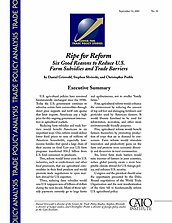Reducing farm subsidies and trade barriers would benefit Americans in six important ways. One, reform would deliver lower food prices to tens of millions of American households, especially lowincome families that spend a large share of their income on food. Last year U.S. farm programs transferred $16.2 billion from U.S. food consumers to producers.
Two, reform would lower costs for U.S. industries, such as confectioners and other food processors, that use agricultural commodities in their final products and would promote trade negotiations to open markets abroad for U.S. exporters.
Three, reducing farm subsidies would save U.S. taxpayers tens of billions of dollars during the next decade. Many of those subsidy payments currently go to large farms and agribusinesses, not to smaller “family farms.”
Four, agricultural reform would enhance the environment by reducing the amount of top soil lost and damaging fertilizers and pesticides used by American farmers. It would liberate farmland to be used for reforestation, recreation, and other more environmentally friendly purposes.
Five, agricultural reform would benefit farmers themselves by promoting production of crops that are in demand by consumers. Farm reform would stimulate innovation and productivity gains on the farm and promote more economic diversity and dynamism in rural communities.
Six, lower farm trade barriers would raise incomes of farmers in poor countries, reduce global poverty, create a more hospitable climate abroad for U.S. foreign policy, and enhance U.S. security.
Congress and the president should seize the opportunity presented by the Doha Round negotiations of the World Trade Organization and the next reauthorization of the farm bill to fundamentally reform U.S. agricultural policy.




